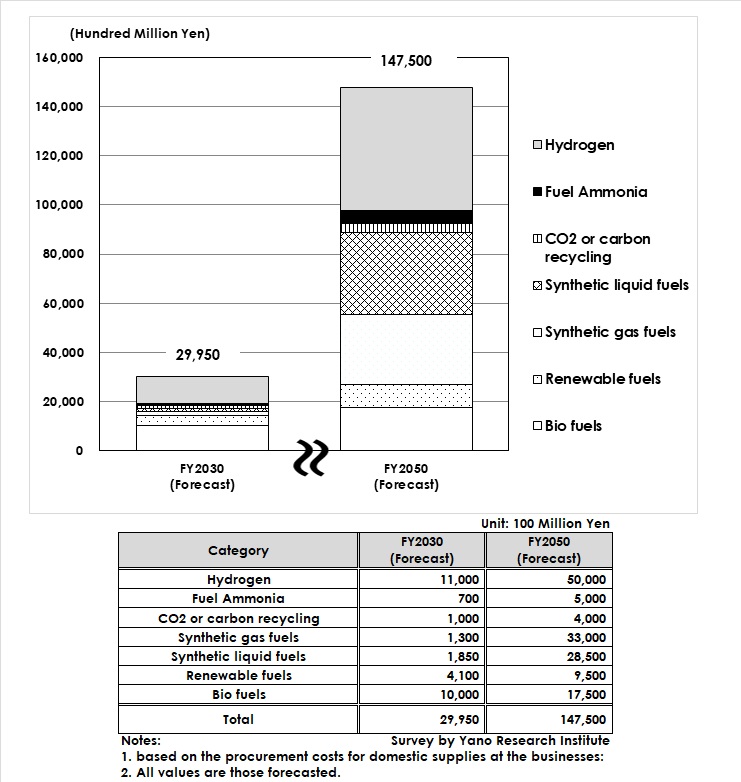No.3196
Carbon Neutral Fuels (Decarbonized Fuels) Market in Japan: Key Research Findings 2023
Carbon Neutral Fuels Market Projected to Expand from 2.995 Billion Yen in FY2030 to 14,750 Billion Yen by FY2050.
Yano Research Institute (the President, Takashi Mizukoshi) carried out a survey on the market of carbon neutral fuels (decarbonized fuels) geared to domestic supplies, and projected the market size for FY2030 and FY2050.

Market Overview
To achieve carbon neutrality target for 2050, the attempts of studies and development as well as of social implementation of carbon neutral fuels (decarbonized fuels) have been in progress. If carbon neutral fuels are widespread, there are many areas where decarbonization can be achieved without the need of changing existing energy infrastructure, facilities and equipment considerably.
As Japan has been mostly dependent on overseas for its procurement of conventional fossil fuels, wider use of diverse carbon neutral fuels should benefit the country not only in terms of decarbonization but also from the viewpoint of energy security.
Carbon neutral fuels can be produced domestically, but overseas businesses hold advantages in mass production at low prices. Therefore, through business development overseas, based on the technologies, equipment, knowhow, and knowledge that eared from the development of carbon neutral fuel technologies, Japan can take the initiative in the carbon neutral fuels market worldwide.
Noteworthy Topics
Trends of Power Producers and Power Utilities
While the Green Transformation (GX) Implementation Council in December 2022 stipulated that “renewable energies will become the main source of power”, propelled hydrogen and fuel ammonia implementation and application of CCS & CCUS, it overturned the existing policy of reducing dependence on nuclear power as much as possible. This is expected to raise the self-sufficiency ratio in energy supply.
However, in order to expand the electricity from renewable energy sources (solar power, wind power, etc.) thermal power generation is necessary for power regulation. Therefore, power producers and power utilities are to introduce hydrogen and fuel ammonia as the fuel for thermal power generation, while propelling renewable energy as well as nuclear power energy generation, thereby to achieve decarbonization. In addition, they plan to strengthen storage battery business and VPP (Virtual Power Plant) business as regulating power.
Five electricity businesses i.e. JERA, Kyushu Electric Power Company, The Chugoku Electric Power Company, Shikoku Electric Power Company, and Tohoku Electric Power Company, are under consideration for collaborating in introductions of hydrogen and fuel ammonia for electricity sources, building and expansion of supply chains from procurement of raw materials, manufacturing, and to distribution as early as possible.
Future Outlook
The carbon neutral fuels (decarbonized fuels) market size based on the procurement cost aiming for domestic supplies at the businesses is projected to achieve 2,995.0 billion yen by FY2030, and 14,750.0 billion yen by FY2050.
When observing the market by category, the largest procurement size is achieved by hydrogen, with total 20 million tons per year or 5 trillion yen (green hydrogen: 10 million tons per year, 2,500 billion yen, and blue hydrogen: 10 million tons per year, 5.000 billion yen), followed by synthetic fuels with total 30 million tons per year or 3,300 billion yen (synthetic methane:25 million tons per year, 1,800 billion yen, green LPG: 5 million tons per year, 1,500 billion yen).
Research Outline
2.Research Object: System and equipment manufacturers, engineering companies, energy suppliers, iron & steel companies, automakers, transport companies, relevant government offices, and industrial groups.
3.Research Methogology: Face-to-face interviews (online included) by our specialized researchers, surveys via telephone and email, and literature research
About Carbon Neutral Fuels (Net-Zero Alternatives to Fossil Fuels) Market
Carbon neutral fuels (decarbonized fuels) refer to those fuels regarded not to emit CO2 in the production processes, and in the combustion fuels at the demanders’ side. The carbo neutral fuels market targets the following seven types of fuels, and the market size has been calculated based on the procurement costs for domestic supplies at the businesses:
1) Hydrogen: Green hydrogen derived from renewable energy, and blue hydrogen derived from fossil fuels and CO2 being collected by CCUS (Carbon Capture, Usage and Storage) technologies.
2) Fuel Ammonia: Green ammonia derived from renewable energy, and ammonia collected in a process of methane reforming.
3) CO2 or carbon recycling: By positioning CO2 as one of resources, thereby to separate and collect it to be reused as a material or a fuel.
4) & 5) Electrofuels or synthetic fuels (in the forms of gas or liquid): Fuels made by synthesizing green hydrogen with CO2 emitted from factories, etc. There are gas types such as synthetic methane (methanation) and synthetic propane or butane (green LPG) and liquid types that are petroleum-alternative fuels.
6) Renewable fuels: Fuels manufactured from non-edible oil such as waste cooking oil. There are renewable diesel fuel and bio jet fuel, etc.
7) Bio fuels: Fermented methane for electricity generation or for combustion, woody biomass, bioethanol for automobiles, etc.
<Products and Services in the Market>
Carbon neutral fuels (decarbonized fuels)
Published Report
Contact Us
The copyright and all other rights pertaining to this report belong to Yano Research Institute.
Please contact our PR team when quoting the report contents for the purpose other than media coverage.
Depending on the purpose of using our report, we may ask you to present your sentences for confirmation beforehand.